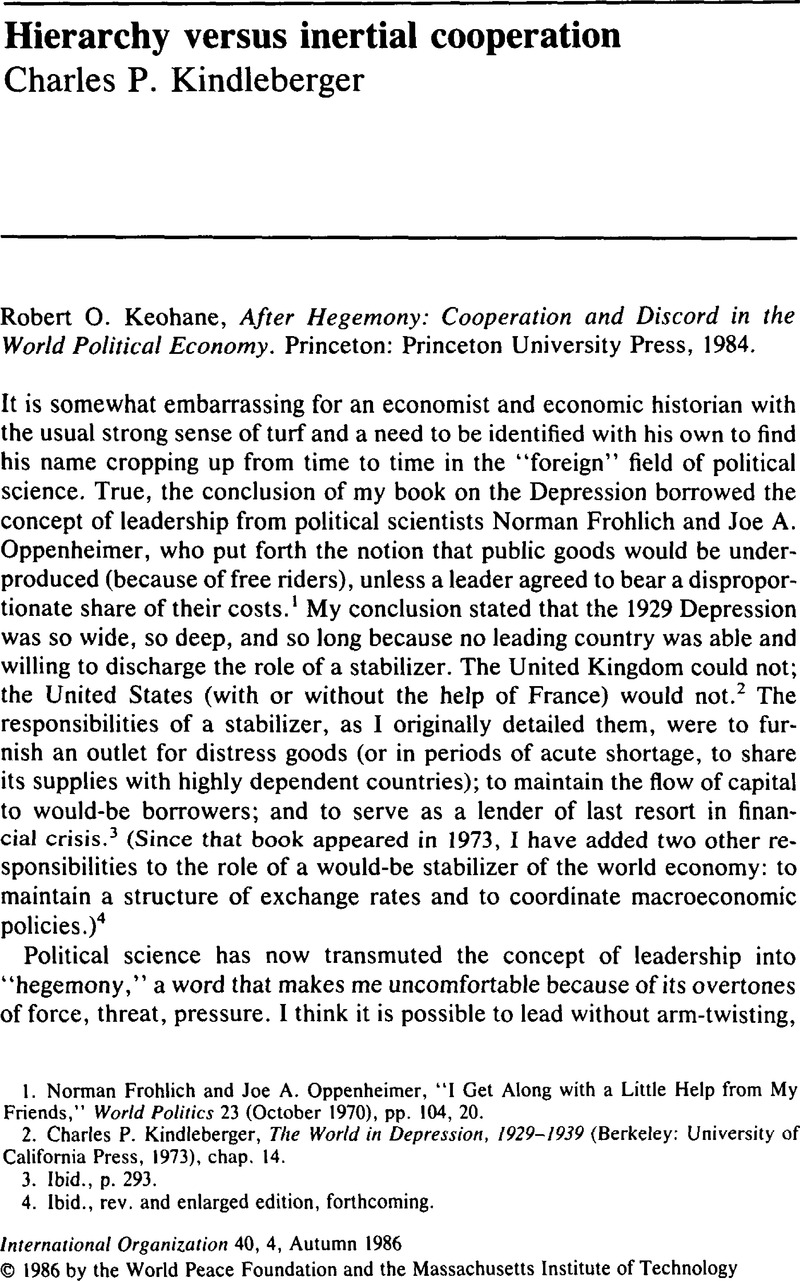Article contents
Hierarchy versus inertial cooperation
Review products
Published online by Cambridge University Press: 22 May 2009
Abstract

Information
- Type
- Review Essays
- Information
- Copyright
- Copyright © The IO Foundation 1986
References
1. Frohlich, Norman and Oppenheimer, Joe A., “I Get Along with a Little Help from My Friends,” World Politics 23 (10 1970), pp. 104, 20CrossRefGoogle Scholar.
2. Kindleberger, Charles P., The World in Depression, 1929–1939 (Berkeley: University of California Press, 1973), chap. 14Google Scholar.
3. Ibid., p. 293.
4. Ibid., rev. and enlarged edition, forthcoming.
5. Krasner, Stephen D., “Structural Causes and Regime Consequences: Regimes as Intervening Variables,” in Krasner, , ed., International Regimes (Ithaca: Cornell University Press, 1983), p. 1Google Scholar.
6. Strange, Susan, “Cave, hie dragones: A Critique of Regime Analysis,” in Krasner, , ed., International Regimes, pp. 337–54Google Scholar.
7. Gowa, Joanne, Closing the Gold Window: Domestic Politics and the End of Brelton Woods (Ithaca: Cornell University Press, 1983)Google Scholar; Lipson, Charles, Standing Guard: Protecting Foreign Capital in the Nineteenth and Twentieth Centuries (Berkeley: University of California Press, 1985)Google Scholar; Young, Oran R., Compliance and Public Authority (Baltimore: Resources for the Future, Johns Hopkins University Press, 1979)Google Scholar; Kxasner, Stephen D., Defending the National Interest: Raw Materials Investments and United States Foreign Policy (Princeton: Princeton University Press, 1978)Google Scholar; Keohane, Robert O., After Hegemony: Cooperation and Discord in the World Political Economy (Princeton: Princeton University Press, 1984)Google Scholar.
8. Axelrod, Robert, The Evolution of Cooperation (New York: Basic, 1984)Google Scholar.
9. Scitovsky, Tibor, “A Reconsideration of the Theory of Tariffs,” in American Economic Association, Readings in the Theory of International Trade (Homewood, 111.: Irwin, 1949)Google Scholar.
10. Jones, Joseph M. Jr, Tariff Retaliation: Repercussions of the Hawley-Smoot Bill (Philadelphia: University of Pennsylvania Press, 1934)CrossRefGoogle Scholar.
11. Jensen, Michael C. and Meckling, W. H., “Theory of the Firm, Agency Costs and Ownership Structure,” Journal of Financial Economics 3 (1976), pp. 305–60CrossRefGoogle Scholar.
12. Rosen, Sherwin, “Implicit Contracts,” Journal of Economic Literature 23 (09 1985), pp. 1144–75Google Scholar.
13. Cooper, Richard N., “International Economic Cooperation: Is It Desirable? Is It Likely?” Bulletin of the American Academy of Arts and Sciences 39 (11 1985)Google Scholar.
14. Hahn, Hans-Werner, “Hegemonie and Integration: Voraussetzungen und Folgen der preussischen Fuhningsrolle in Deutsche Zollverein,” in Berding, Helmut, ed., Wirtschaftliche und politische Integration in Europe in 19. und 20. Jahrhundert (Gottingen: Vandenboeck & Ruprecht, 1984), pp. 45–70Google Scholar.
15. Diebold, William Jr, “The United States in the World Economy: A Fifty-Year Perspective,” Foreign Affairs 61 (Fall 1983), pp. 81–104CrossRefGoogle Scholar.
- 32
- Cited by

